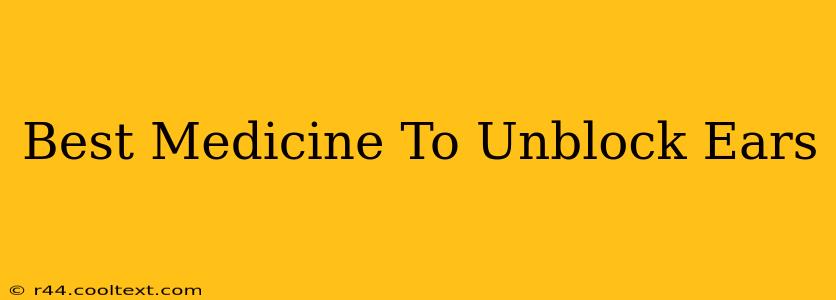Experiencing that annoying feeling of clogged ears? It's incredibly common, and thankfully, there are several effective ways to unblock them. This post will explore the best medicines and home remedies to alleviate ear blockage, helping you regain clear hearing quickly and safely. We'll also discuss when you should seek professional medical advice.
Understanding Ear Blockage
Before diving into solutions, let's understand what causes ears to become blocked. Several factors can contribute, including:
- Earwax Buildup: Excess earwax can impede sound waves and create a feeling of fullness or pressure.
- Fluid Buildup (Serous Otitis Media): This often occurs after an upper respiratory infection, resulting in fluid trapped behind the eardrum.
- Eustachian Tube Dysfunction: The Eustachian tube connects the middle ear to the back of the throat. If it becomes blocked, it can prevent proper pressure equalization, leading to blockage.
- Allergies: Allergies can trigger inflammation and fluid buildup in the ears.
- Changes in Altitude: Rapid changes in altitude, such as during air travel, can cause pressure imbalances.
- Infection: Ear infections can cause inflammation and blockage.
Best Medicines to Unblock Ears
While many cases of ear blockage resolve on their own, certain over-the-counter medications can provide relief. Always consult your doctor or pharmacist before using any medication, especially if you have pre-existing conditions.
Decongestants:
Oral decongestants can help shrink swollen tissues in the Eustachian tube, relieving pressure and improving drainage. These are particularly useful if your ear blockage is related to allergies or a cold. However, prolonged use of decongestants is discouraged.
Saline Nasal Spray:
Saline nasal spray can help clear nasal passages, which are connected to the Eustachian tubes. This can indirectly help improve drainage and relieve ear pressure.
Effective Home Remedies to Unblock Ears
Several home remedies can help alleviate ear blockage, particularly those caused by earwax buildup or mild Eustachian tube dysfunction. These remedies are not suitable for all cases of ear blockage, and professional medical advice is crucial if symptoms worsen or persist.
Warm Compress:
Applying a warm compress to the affected ear can help soothe discomfort and promote drainage. Simply soak a clean cloth in warm (not hot) water, wring it out, and apply it gently to your ear.
Yawning and Swallowing:
These actions help open the Eustachian tubes, equalizing pressure and potentially relieving blockage. Try yawning widely or swallowing repeatedly.
Valsalva Maneuver (Use with Caution):
This involves gently blowing air out of your nose while pinching your nostrils and closing your mouth. This should be performed cautiously and only if you understand the correct technique, as incorrect execution can damage your eardrum.
Ear Candling (Not Recommended):
Despite its popularity, ear candling is not recommended by medical professionals. There is no scientific evidence to support its effectiveness, and it carries a risk of burns and other injuries.
When to See a Doctor
Seek immediate medical attention if you experience:
- Severe ear pain
- Sudden hearing loss
- Drainage from the ear (especially if it's pus or blood)
- Fever
- Vertigo (dizziness)
- Symptoms that persist for more than a few days
Disclaimer: This information is for general knowledge and does not constitute medical advice. Always consult a healthcare professional for diagnosis and treatment of any medical condition. Self-treating can be dangerous, and professional guidance is crucial for ensuring proper care.

